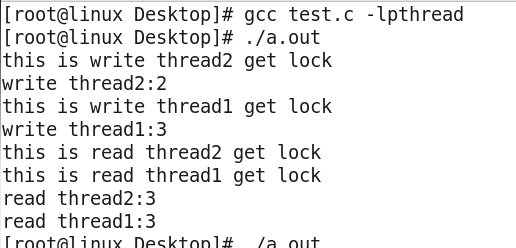- 【Linux】线程——线程池、线程池的实现、线程安全的线程池、单例模式的概念、饿汉和懒汉模式、互斥锁、条件变量、信号量、自旋锁、读写锁
鳄鱼麻薯球
Linuxlinux安全单例模式
文章目录Linux线程7.线程池7.1线程池介绍7.2线程池的实现7.3线程安全的线程池7.3.1单例模式的概念7.3.2饿汉和懒汉模式8.常见锁使用汇总8.1互斥锁(Mutex)8.2条件变量(ConditionVariable)8.3信号量(Semaphore)8.4自旋锁(SpinLock)8.5读写锁(Read-WriteLock)Linux线程7.线程池 线程池是一种多线程编程中的技术
- 分布式事务常见的几种实现方式
星域_03zhan
Java分布式java数据库
文章目录事务概念:分布式事务常见的实现方式1.全局事务XA模式(一般不使用)2.TCC模式3.可靠消息服务4.AT模式事务概念:单机事务(本地事务):对于单系统事务它必须满足四大特性ACID:原子性、数据一致性、隔离性、持久性。其中C(数据一致性)是要达到的目的,也就是说通过AID来实现C。原子性是通过undolog来实现的;持久性是通过redolog来实现的。隔离性是通过读写锁+MVCC来实现的
- 【无标题】
华强笔记
c语言核心问题linuxc语言
Linux内核锁机制详解与C语言实践指南目录Linux内核中的锁类型自旋锁(Spinlocks)互斥锁(Mutexes)信号量(Semaphores)读写锁(Reader-WriterLocks)RCU(Read-Copy-Update)顺序锁(Seqlocks)原子操作(AtomicOperations)C语言中锁的正确使用模式基本使用原则锁的嵌套处理中断上下文处理读写锁应用RCU模式实践常见错
- java多线程-锁的介绍
多线程中常用锁一、锁的概念二、锁的类型2.1互斥锁(也称排它锁)2.1.1Synchronized和Lock2.1.2ReentrantLock(可重入锁)2.1.3公平锁2.1.4非公平锁2.1.5中断锁2.2共享锁2.3读写锁三、悲观锁和乐观锁3.1悲观锁3.2乐观锁3.3CAS算法四、锁竞争一、锁的概念在多线程中,有乐观锁、悲观锁等很多锁的概念,在了解锁的概念之前我们需要先知道线程和进程以及
- iOS线程安全数组
iOS-SDK只提供了非线程安全的数组。如果要多线程并发的使用一个数组对象就必须要加锁,平凡的加锁使得代码的调用非常的麻烦。我们需要多线程的读写锁在类的内部实现,所以需要对NSMutableArray进行封装,封装后的对象负责接受所有事件并将其转发给真正的NSMutableArrayiOS-SDK只提供了非线程安全的数组。如果要多线程并发的使用一个数组对象就必须要加锁,平凡的加锁使得代码的调用非常
- MySQL MVCC 详解
MySQLMVCC详解维基百科上关于MVCC的介绍:多版本并发控制(Multiversionconcurrencycontrol,MCC或MVCC),是数据库管理系统常用的一种并发控制,也用于程序设计语言实现事务内存。MVCC意图解决读写锁造成的多个、长时间的读操作饿死写操作问题。每个事务读到的数据项都是一个历史快照,并依赖于实现的隔离级别。写操作不覆盖已有数据项,而是创建一个新的版本,直至所在操
- Java并发性能优化|读写锁与互斥锁解析
云心雨禅
技术实操java性能优化开发语言
前言在Java的世界中,多线程如同一场精密的交响乐。而“锁”,就是指挥家手中的那根指挥棒——它决定了谁先演奏、谁后进入、谁必须等待。本文将带你走进两种常见的同步机制:普通互斥锁(如synchronized和ReentrantLock)与读写分离的读写锁(ReentrantReadWriteLock),通过概念对比、代码示例、性能测试和最佳实践,帮助你理解它们的本质区别与适用场景。掌握锁的使用之道,
- Windows内核并发优化
Windows内核并发优化通过多层次技术手段提升多核环境下的系统性能,以下是关键技术实现方案:一、内核锁机制优化精细化锁策略采用自旋锁(Spinlock)替代信号量处理短临界区,减少线程切换开销对共享资源实施读写锁分离,如文件系统元数据采用ERESOURCE结构实现读写并发无锁数据结构关键路径(如调度队列)使用Interlocked原子操作指令(如lockcmpxchg)实现无锁同步内存分配
- 嵌入式Linux-线程同步-自旋锁和读写锁
线程同步一、自旋锁1.1自旋锁概述1.2自旋锁的初始化1.3自旋锁加锁和解锁二、读写锁2.1何为读写锁2.2读写函数初始化2.3读写锁上锁和解锁2.4读写锁的属性一、自旋锁1.1自旋锁概述自旋锁与互斥锁很相似,从本质上说也是一把锁,在访问共享资源之前对自旋锁进行上锁,在访问完成后释放自旋锁(解锁);事实上,从实现方式上来说,互斥锁是基于自旋锁来实现的,所以自旋锁相较于互斥锁更加底层。如果在获取自旋
- 互斥锁、自旋锁、读写锁、条件锁、悲观锁、乐观锁
pipi糖
操作系统
一.互斥锁(Mutex)互斥锁用于控制多个线程对他们之间共享资源互斥访问的一个信号量。也就是说是为了避免多个线程在某一时刻同时操作(如修改)一个共享资源。如果占用共享资源的线程释放互斥量时,有一个以上的线程阻塞,那么所有该锁上的阻塞线程进入准备就绪状态(其中也包括释放锁的线程,该线程也会进入就绪队列),准备就绪状态的所有线程,通过竞争,进入运行状态,然后竞争获取锁资源。二.自旋锁(Mutex)自旋
- 『 Linux 』线程安全的单例模式,自旋锁与读写锁
Dio夹心小面包
线程LinuxC++linux单例模式javascript服务器c++运维
文章目录单例模式懒汉模式与饿汉模式自旋锁读写锁单例模式单例模式是一种创建型设计模式,其主要目的是确保一个类只有一个实例,并提供一个全局访问点来访问该实例;这在需要严格控制如何及合适访问某个唯一资源型下有一定作用;单利模式的主要特点为如下:私有构造函数单例模式通常要将构造私有化,以保证无法直接通过该类实例化出对应的对象;只能通过该类提供对应的接口来实例化整个对象,确保只有一个实例;私有静态实例私有静
- Linux-读者写者问题
“αβ”
Linuxlinux运维服务器c++多线程git云服务器
目录问题描述读写锁主要思想代码伪实现读者优先算法写者优先算法读者写者公平算法库函数的学习读写锁接口读写锁使用案例问题描述在编写多线程的时候,有一种情况是十分常见的。那就是,有些公共数据修改的机会比较少。相比较改写,它们读的机会反而高的多。通常而言,在读的过程中,往往伴随着查找的操作,中间耗时很长。给这种代码段加锁,会极大地降低我们程序的效率。这类问题就归结为读者写者问题。那么有没有一种方法,可以专
- 鸿蒙关系型数据库实战:高效数据存储与管理
数据库harmonyos
在鸿蒙应用开发中,关系型数据库(RDB)是结构化数据存储的核心方案。通过深度实践,其基于SQLite的轻量级实现不仅性能出色,更提供了强大的事务支持和类型安全。以下是关键经验总结:三大核心优势:SQL兼容:完整支持SQL92标准语法线程安全:内置多线程读写锁机制加密存储:支持AES-256加密敏感数据关系型数据库实战封装及使用:在Utils目录下新建一个RdbUtils文件//./src/main
- 进程、线程和进程间通信课程 Day4学习要点总结
我在南山当吗喽 我在南山当吗喽
学习javajvm
本章是线程的取消、清理,互斥和同步,以及互斥锁、读写锁和死锁的内容一、线程取消机制(一)核心概念线程取消不是“立刻杀死”,而是一种协作式机制:发起方:主线程用pthread_cancel(tid)发送“取消请求”接收方:子线程需遇到取消点(或主动调用pthread_testcancel())才会响应结果:子线程响应后,会模拟执行pthread_exit(PTHREAD_CANCELED),主线程p
- 面试问答总结之并发编程
信计2102罗铠威
javaEE系列专栏面试java多线程并发编程
文章目录个人主页:信计2102罗铠威JavaEE系列专栏前言:多线程的优点、缺点并发编程的核心问题:不可见性、乱序性、非原子性不可见性乱序性非原子性JMM(java内存模型)volatile关键字:保证可见性、禁止指令重排序CAS机制(ConpareAndSwap比较并交换)CAS会产生ABA问题java中锁的分类乐观锁、悲观锁可重入锁读写锁ReentrantReadwriteLock分段锁自旋锁
- 【线程同步】
Bin努力加餐饭
linux
概念线程同步是指当一个线程在对某个临界资源进行操作时,其它线程都不可以对这个资源进行操作,直到该线程完成操作,其他线程才能操作,也就是协调同步,让线程按预定的先后次序进行运行。线程同步的方法有四种:互斥锁、信号量、条件变量、读写锁竞态条件:当多个执行单元以不受控的方式同时访问共享资源,并且最终的结果依赖于各线程的执行顺序时,就会产生竞态条件。这种情况会导致结果具有不确定性。临界区:存在竞态条件的代
- golang 一种并发安全 map 的实现
mxpan
golanggolang开发语言
在Go语言的并发编程场景中,标准库中的map类型并不是并发安全的。当多个goroutine同时对map进行读写操作时,很容易引发竞态条件(racecondition),导致程序出现不可预测的错误。为了解决这一问题,我们可以通过自定义结构体,结合读写锁来实现一个并发安全的map,本文就来详细介绍一种安全map的实现方法。代码实现packagemainimport("sync")typesafeMap
- Java并发编程实战 Day 16:并发编程中的锁进阶
在未来等你
Java并发编程实战javaconcurrency多线程并发编程锁机制StampedLockJava并发编程实战
【Java并发编程实战Day16】并发编程中的锁进阶文章简述在高并发系统中,锁是控制资源访问的核心机制。Day16的文章深入探讨了Java并发编程中的“锁进阶”主题,重点介绍StampedLock、读写锁的实现原理以及如何在实际业务场景中合理选择和使用锁机制。文章不仅从理论层面解析了锁的底层实现机制(如JVM中的CAS操作、锁升级过程等),还结合代码示例和性能测试数据,展示不同锁策略对系统吞吐量和
- 【后端开发】goland分布式锁的几种实现方式(mysql,redis,etcd,zookeeper,mq,s3)
小哈里
#后端开发mysqlredis分布式锁etcdzookeepermq
【后端开发】goland分布式锁的几种实现方式(mysql,redis,etcd,zookeeper,mq,s3)文章目录1、分布式锁实现方案对比(mysql,redis,etcd,zookeeper,mq,s3)2、锁的常见策略(乐观/悲观,可重入/不可重入,公平/非公平,自旋锁,读写锁)3、基于redis,mysql的实现(缓存,AP-高性能)4、基于etcd,zk的实现(分布式协调系统,CP
- 使用 Redisson 实现分布式锁—解决方案详解
颜淡慕潇
Redis系列分布式wpfredisredisson
Redisson是Redis官方推荐的Java客户端,提供了一系列分布式服务实现,其中分布式锁是其核心功能之一。本文将深入解析Redisson分布式锁的实现原理、高级特性和最佳实践。一、Redisson分布式锁的优势与传统实现的对比特性手动实现Redisson实现锁续期需手动实现看门狗内置自动续期机制可重入性不支持原生支持可重入锁锁类型基础锁公平锁/联锁/读写锁/红锁等待机制自旋或阻塞订阅发布机制
- Golang安全编程:并发安全与锁机制详解
Golang编程笔记
Golang编程笔记Golang开发实战golang安全开发语言ai
Golang安全编程:并发安全与锁机制详解关键词:Golang、并发安全、锁机制、互斥锁、读写锁、原子操作、竞态条件摘要:本文深入解析Golang并发编程中的安全问题与锁机制。通过剖析Goroutine与CSP模型的核心原理,系统讲解竞态条件的产生机制及解决方案。结合具体代码示例,详细阐述sync.Mutex、sync.RWMutex、原子操作等同步原语的实现原理、适用场景及最佳实践。通过银行账户
- ReentrantReadWriteLock 简介
一个憨憨coder
java并发javajava
ReentrantReadWriteLock是Java中java.util.concurrent.locks包提供的一个可重入的读写锁,它允许多个读线程同时访问共享资源,但在写线程存在时不允许任何读线程或写线程访问。这种机制非常适合读多写少的场景。一、基本概念1.什么是读写锁?读锁(ReadLock):多个线程可以同时获取读锁(共享锁),适用于只读操作。写锁(WriteLock):只有一个线程能获
- C++读写锁以及实现方式
编程小能手@
c++开发语言读写锁
文章目录【C++专题】读写锁(Reader-WriterLock)原理与实现方式(含C++11/20实践)一、读写锁核心概念1.**什么是读写锁?**2.**读写锁vs互斥锁**二、C++中的读写锁实现方式方案一:POSIX读写锁(pthread_rwlock)1.**关键接口**2.**使用示例:缓存读取与更新**3.**注意事项**方案二:C++20共享互斥锁(std::shared_mute
- Linux-读者写著问题和读写锁
五花肉村长
Linux开发语言linux运维服务器visualstudio数据库
1.读者写者问题在Linux系统中,读者写者问题是一个经典的并发控制问题,涉及多个线程(或进程)对共享资源的访问控制,主要目标是允许多个读者并发读取共享资源,但要求写者独占访问,以保证数据的一致性和完整性。2.核心问题读者(Readers):多个读者可以同时读取共享资源,因为读操作不会改变数据。写者(Writers):写者必须独占访问共享资源,因为写操作会改变数据,若与其他线程(读或写)同时访问,
- 关于Redisson分布式锁的用法
黑风风
框架设计Spring参考手册分布式
关于Redisson分布式锁的用法Redisson是一个基于Redis的Java分布式对象和服务框架,它提供了多种分布式锁的实现,包括可重入锁、公平锁、读写锁等。Redisson实现分布式锁的核心原理主要依赖于Redis的数据结构和Redisson框架提供的高级功能。以下详细讲解Redisson如何实现分布式锁:1.数据结构选择Redisson分布式锁主要使用了Redis的字符串(String)数
- Golang领域RWMutex:并发编程的新宠儿
Golang编程笔记
golang开发语言后端ai
Golang领域RWMutex:并发编程的新宠儿关键词:Golang、RWMutex、并发编程、读写锁、同步机制、性能优化、锁竞争摘要:在高并发编程场景中,如何高效地协调多个goroutine对共享资源的访问是核心挑战之一。Golang标准库提供的sync.RWMutex(读写互斥锁)通过读写操作分离的设计,显著提升了读多写少场景下的并发性能。本文从基础概念出发,深入剖析RWMutex的核心原理、
- 读写锁应用场景,适合读多写少
weixin_42173948
linuxc语言
以下ASCII结构图展示了读写锁的并发控制机制:读者线程1----+|读锁共享读者线程2----+|写锁互斥写者线程-----+该实现采用pthread读写锁(pthread_rwlock_t)和多线程技术,成功模拟了缓存和全局配置的高并发读取与低频写入场景。通过读写锁机制,实现了多线程安全并发读取,同时确保写入操作的互斥性。创建线程创建线程创建线程读锁读锁写锁StartReader1Reader
- mysql锁
生命不息战斗不止!
mysql数据库
面试练习表锁底层原理,行锁底层原理:RC/RR级别用id主键列单列与范围操作?RC/RR级别用二级唯一索引列单列/范围操作?RC和RR用二级非唯一索引单列/范围操作?RC和RR用非索引单列/范围操作锁的分类?数据操作类型:读锁&写锁按细粒度划分表锁:表锁又细分为元数据锁,意向锁,自增锁,表级读写锁行锁:只有innodb引擎才有行锁,又细分为记录锁,间隙锁,临间锁,插入意向锁页锁对待锁的态度上:悲观
- Java并发编程-锁(七)
递归书房
Java基础系列java开发语言
文章目录AQS的使用示例:读写锁拓展:锁的升级与降级一、内置锁(`synchronized`)的级别与升级1.锁的级别2.锁升级过程二、显式锁的降级(以`ReentrantReadWriteLock`为例)1.什么是锁降级2.锁降级的核心意义3.经典实现示例4.锁降级与升级的限制三、总结对比AQS的使用示例:读写锁刚刚提到的锁(比如Mutex和ReentrantLock)都是排他锁,这些锁在同一时
- Linux多线(进)程编程——番外2:信号量实现读写锁
庐阳寒月
linux操作系统linux嵌入式c语言
前言对于数据库(可以看作共享内存)等高并发的服务器,需要同时应对很多请求,这些请求里有读请求也有写请求。如果每次来一个请求的时候就给数据库加一个锁,或者使用单一信号量限制单进程访问,那么系统的性能会受到极大的影响,失去多进程的优势。为了解决这个问题,可以考虑使用读写锁。读写锁读写锁的功能:读写锁是指,当允许多个进程同时以读的方式访问共享资源,但是只能允许一个进程向共享资源内写入数据,同时在写入数据
- apache 安装linux windows
墙头上一根草
apacheinuxwindows
linux安装Apache 有两种方式一种是手动安装通过二进制的文件进行安装,另外一种就是通过yum 安装,此中安装方式,需要物理机联网。以下分别介绍两种的安装方式
通过二进制文件安装Apache需要的软件有apr,apr-util,pcre
1,安装 apr 下载地址:htt
- fill_parent、wrap_content和match_parent的区别
Cb123456
match_parentfill_parent
fill_parent、wrap_content和match_parent的区别:
1)fill_parent
设置一个构件的布局为fill_parent将强制性地使构件扩展,以填充布局单元内尽可能多的空间。这跟Windows控件的dockstyle属性大体一致。设置一个顶部布局或控件为fill_parent将强制性让它布满整个屏幕。
2) wrap_conte
- 网页自适应设计
天子之骄
htmlcss响应式设计页面自适应
网页自适应设计
网页对浏览器窗口的自适应支持变得越来越重要了。自适应响应设计更是异常火爆。再加上移动端的崛起,更是如日中天。以前为了适应不同屏幕分布率和浏览器窗口的扩大和缩小,需要设计几套css样式,用js脚本判断窗口大小,选择加载。结构臃肿,加载负担较大。现笔者经过一定时间的学习,有所心得,故分享于此,加强交流,共同进步。同时希望对大家有所
- [sql server] 分组取最大最小常用sql
一炮送你回车库
SQL Server
--分组取最大最小常用sql--测试环境if OBJECT_ID('tb') is not null drop table tb;gocreate table tb( col1 int, col2 int, Fcount int)insert into tbselect 11,20,1 union allselect 11,22,1 union allselect 1
- ImageIO写图片输出到硬盘
3213213333332132
javaimage
package awt;
import java.awt.Color;
import java.awt.Font;
import java.awt.Graphics;
import java.awt.image.BufferedImage;
import java.io.File;
import java.io.IOException;
import javax.imagei
- 自己的String动态数组
宝剑锋梅花香
java动态数组数组
数组还是好说,学过一两门编程语言的就知道,需要注意的是数组声明时需要把大小给它定下来,比如声明一个字符串类型的数组:String str[]=new String[10]; 但是问题就来了,每次都是大小确定的数组,我需要数组大小不固定随时变化怎么办呢? 动态数组就这样应运而生,龙哥给我们讲的是自己用代码写动态数组,并非用的ArrayList 看看字符
- pinyin4j工具类
darkranger
.net
pinyin4j工具类Java工具类 2010-04-24 00:47:00 阅读69 评论0 字号:大中小
引入pinyin4j-2.5.0.jar包:
pinyin4j是一个功能强悍的汉语拼音工具包,主要是从汉语获取各种格式和需求的拼音,功能强悍,下面看看如何使用pinyin4j。
本人以前用AscII编码提取工具,效果不理想,现在用pinyin4j简单实现了一个。功能还不是很完美,
- StarUML学习笔记----基本概念
aijuans
UML建模
介绍StarUML的基本概念,这些都是有效运用StarUML?所需要的。包括对模型、视图、图、项目、单元、方法、框架、模型块及其差异以及UML轮廓。
模型、视与图(Model, View and Diagram)
&
- Activiti最终总结
avords
Activiti id 工作流
1、流程定义ID:ProcessDefinitionId,当定义一个流程就会产生。
2、流程实例ID:ProcessInstanceId,当开始一个具体的流程时就会产生,也就是不同的流程实例ID可能有相同的流程定义ID。
3、TaskId,每一个userTask都会有一个Id这个是存在于流程实例上的。
4、TaskDefinitionKey和(ActivityImpl activityId
- 从省市区多重级联想到的,react和jquery的差别
bee1314
jqueryUIreact
在我们的前端项目里经常会用到级联的select,比如省市区这样。通常这种级联大多是动态的。比如先加载了省,点击省加载市,点击市加载区。然后数据通常ajax返回。如果没有数据则说明到了叶子节点。 针对这种场景,如果我们使用jquery来实现,要考虑很多的问题,数据部分,以及大量的dom操作。比如这个页面上显示了某个区,这时候我切换省,要把市重新初始化数据,然后区域的部分要从页面
- Eclipse快捷键大全
bijian1013
javaeclipse快捷键
Ctrl+1 快速修复(最经典的快捷键,就不用多说了)Ctrl+D: 删除当前行 Ctrl+Alt+↓ 复制当前行到下一行(复制增加)Ctrl+Alt+↑ 复制当前行到上一行(复制增加)Alt+↓ 当前行和下面一行交互位置(特别实用,可以省去先剪切,再粘贴了)Alt+↑ 当前行和上面一行交互位置(同上)Alt+← 前一个编辑的页面Alt+→ 下一个编辑的页面(当然是针对上面那条来说了)Alt+En
- js 笔记 函数
征客丶
JavaScript
一、函数的使用
1.1、定义函数变量
var vName = funcation(params){
}
1.2、函数的调用
函数变量的调用: vName(params);
函数定义时自发调用:(function(params){})(params);
1.3、函数中变量赋值
var a = 'a';
var ff
- 【Scala四】分析Spark源代码总结的Scala语法二
bit1129
scala
1. Some操作
在下面的代码中,使用了Some操作:if (self.partitioner == Some(partitioner)),那么Some(partitioner)表示什么含义?首先partitioner是方法combineByKey传入的变量,
Some的文档说明:
/** Class `Some[A]` represents existin
- java 匿名内部类
BlueSkator
java匿名内部类
组合优先于继承
Java的匿名类,就是提供了一个快捷方便的手段,令继承关系可以方便地变成组合关系
继承只有一个时候才能用,当你要求子类的实例可以替代父类实例的位置时才可以用继承。
在Java中内部类主要分为成员内部类、局部内部类、匿名内部类、静态内部类。
内部类不是很好理解,但说白了其实也就是一个类中还包含着另外一个类如同一个人是由大脑、肢体、器官等身体结果组成,而内部类相
- 盗版win装在MAC有害发热,苹果的东西不值得买,win应该不用
ljy325
游戏applewindowsXPOS
Mac mini 型号: MC270CH-A RMB:5,688
Apple 对windows的产品支持不好,有以下问题:
1.装完了xp,发现机身很热虽然没有运行任何程序!貌似显卡跑游戏发热一样,按照那样的发热量,那部机子损耗很大,使用寿命受到严重的影响!
2.反观安装了Mac os的展示机,发热量很小,运行了1天温度也没有那么高
&nbs
- 读《研磨设计模式》-代码笔记-生成器模式-Builder
bylijinnan
java设计模式
声明: 本文只为方便我个人查阅和理解,详细的分析以及源代码请移步 原作者的博客http://chjavach.iteye.com/
/**
* 生成器模式的意图在于将一个复杂的构建与其表示相分离,使得同样的构建过程可以创建不同的表示(GoF)
* 个人理解:
* 构建一个复杂的对象,对于创建者(Builder)来说,一是要有数据来源(rawData),二是要返回构
- JIRA与SVN插件安装
chenyu19891124
SVNjira
JIRA安装好后提交代码并要显示在JIRA上,这得需要用SVN的插件才能看见开发人员提交的代码。
1.下载svn与jira插件安装包,解压后在安装包(atlassian-jira-subversion-plugin-0.10.1)
2.解压出来的包里下的lib文件夹下的jar拷贝到(C:\Program Files\Atlassian\JIRA 4.3.4\atlassian-jira\WEB
- 常用数学思想方法
comsci
工作
对于搞工程和技术的朋友来讲,在工作中常常遇到一些实际问题,而采用常规的思维方式无法很好的解决这些问题,那么这个时候我们就需要用数学语言和数学工具,而使用数学工具的前提却是用数学思想的方法来描述问题。。下面转帖几种常用的数学思想方法,仅供学习和参考
函数思想
把某一数学问题用函数表示出来,并且利用函数探究这个问题的一般规律。这是最基本、最常用的数学方法
- pl/sql集合类型
daizj
oracle集合typepl/sql
--集合类型
/*
单行单列的数据,使用标量变量
单行多列数据,使用记录
单列多行数据,使用集合(。。。)
*集合:类似于数组也就是。pl/sql集合类型包括索引表(pl/sql table)、嵌套表(Nested Table)、变长数组(VARRAY)等
*/
/*
--集合方法
&n
- [Ofbiz]ofbiz初用
dinguangx
电商ofbiz
从github下载最新的ofbiz(截止2015-7-13),从源码进行ofbiz的试用
1. 加载测试库
ofbiz内置derby,通过下面的命令初始化测试库
./ant load-demo (与load-seed有一些区别)
2. 启动内置tomcat
./ant start
或
./startofbiz.sh
或
java -jar ofbiz.jar
&
- 结构体中最后一个元素是长度为0的数组
dcj3sjt126com
cgcc
在Linux源代码中,有很多的结构体最后都定义了一个元素个数为0个的数组,如/usr/include/linux/if_pppox.h中有这样一个结构体: struct pppoe_tag { __u16 tag_type; __u16 tag_len; &n
- Linux cp 实现强行覆盖
dcj3sjt126com
linux
发现在Fedora 10 /ubutun 里面用cp -fr src dest,即使加了-f也是不能强行覆盖的,这时怎么回事的呢?一两个文件还好说,就输几个yes吧,但是要是n多文件怎么办,那还不输死人呢?下面提供三种解决办法。 方法一
我们输入alias命令,看看系统给cp起了一个什么别名。
[root@localhost ~]# aliasalias cp=’cp -i’a
- Memcached(一)、HelloWorld
frank1234
memcached
一、简介
高性能的架构离不开缓存,分布式缓存中的佼佼者当属memcached,它通过客户端将不同的key hash到不同的memcached服务器中,而获取的时候也到相同的服务器中获取,由于不需要做集群同步,也就省去了集群间同步的开销和延迟,所以它相对于ehcache等缓存来说能更好的支持分布式应用,具有更强的横向伸缩能力。
二、客户端
选择一个memcached客户端,我这里用的是memc
- Search in Rotated Sorted Array II
hcx2013
search
Follow up for "Search in Rotated Sorted Array":What if duplicates are allowed?
Would this affect the run-time complexity? How and why?
Write a function to determine if a given ta
- Spring4新特性——更好的Java泛型操作API
jinnianshilongnian
spring4generic type
Spring4新特性——泛型限定式依赖注入
Spring4新特性——核心容器的其他改进
Spring4新特性——Web开发的增强
Spring4新特性——集成Bean Validation 1.1(JSR-349)到SpringMVC
Spring4新特性——Groovy Bean定义DSL
Spring4新特性——更好的Java泛型操作API
Spring4新
- CentOS安装JDK
liuxingguome
centos
1、行卸载原来的:
[root@localhost opt]# rpm -qa | grep java
tzdata-java-2014g-1.el6.noarch
java-1.7.0-openjdk-1.7.0.65-2.5.1.2.el6_5.x86_64
java-1.6.0-openjdk-1.6.0.0-11.1.13.4.el6.x86_64
[root@localhost
- 二分搜索专题2-在有序二维数组中搜索一个元素
OpenMind
二维数组算法二分搜索
1,设二维数组p的每行每列都按照下标递增的顺序递增。
用数学语言描述如下:p满足
(1),对任意的x1,x2,y,如果x1<x2,则p(x1,y)<p(x2,y);
(2),对任意的x,y1,y2, 如果y1<y2,则p(x,y1)<p(x,y2);
2,问题:
给定满足1的数组p和一个整数k,求是否存在x0,y0使得p(x0,y0)=k?
3,算法分析:
(
- java 随机数 Math与Random
SaraWon
javaMathRandom
今天需要在程序中产生随机数,知道有两种方法可以使用,但是使用Math和Random的区别还不是特别清楚,看到一篇文章是关于的,觉得写的还挺不错的,原文地址是
http://www.oschina.net/question/157182_45274?sort=default&p=1#answers
产生1到10之间的随机数的两种实现方式:
//Math
Math.roun
- oracle创建表空间
tugn
oracle
create temporary tablespace TXSJ_TEMP
tempfile 'E:\Oracle\oradata\TXSJ_TEMP.dbf'
size 32m
autoextend on
next 32m maxsize 2048m
extent m
- 使用Java8实现自己的个性化搜索引擎
yangshangchuan
javasuperword搜索引擎java8全文检索
需要对249本软件著作实现句子级别全文检索,这些著作均为PDF文件,不使用现有的框架如lucene,自己实现的方法如下:
1、从PDF文件中提取文本,这里的重点是如何最大可能地还原文本。提取之后的文本,一个句子一行保存为文本文件。
2、将所有文本文件合并为一个单一的文本文件,这样,每一个句子就有一个唯一行号。
3、对每一行文本进行分词,建立倒排表,倒排表的格式为:词=包含该词的总行数N=行号
